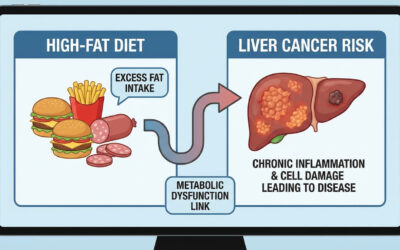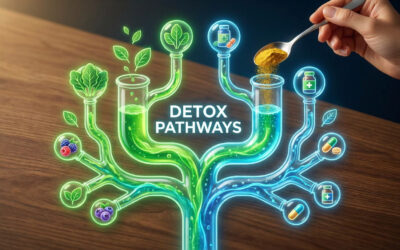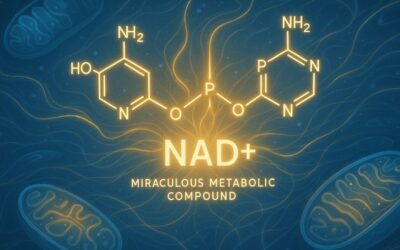Wait—iodine? Didn’t we fix that a century ago with iodized salt? Turns out… not for everyone.
A Brown University pediatric endocrinologist, Dr. Monica Serrano-Gonzalez, has been seeing more kids and teens with iodine deficiency—yes, in 2025—and her team is sounding the alarm in plain English: we’re drifting away from the few reliable iodine sources we have, and it’s showing up in clinic. Chronic iodine deficiency can have serious long-term health consequences, including developmental delays, goiter, and increased risk of certain cancers.
Recent findings from national nutrition examination surveys, such as the National Health and Nutrition Examination Survey (NHANES), show a resurgence of iodine deficiency in the population, highlighting the importance of monitoring iodine status and maintaining adequate intake.
A real-world example
Dr. Monica Serrano-Gonzalez saw a 13-year-old showed up with a rapidly growing goiter. Autoimmune labs were negative. His diet? Super restricted—no eggs, dairy, or seafood; family cooked with non-iodized salt. Urine test confirmed iodine deficiency, indicating that the child’s dietary intake provided insufficient amounts of iodine. Low urinary iodine levels are a marker of insufficient iodine intake, which can lead to health issues such as goiter and hypothyroidism. Iodine deficiency can cause goiter, hypothyroidism, neurodevelopmental deficits, and other physical and neurological abnormalities, especially in children. With iodine added (and more variety in his diet), the goiter shrank within weeks.
Why iodine matters (big time)
Iodine is the raw material your body uses to make thyroid hormone—the dial that sets your metabolism, energy, temperature, and brain development. When iodine is too low for too long, the thyroid swells (goiter) trying to compensate. An underactive thyroid can result from prolonged iodine deficiency, leading to symptoms like fatigue and weight gain. When iodine is low, thyroid stimulating hormone increases as the body tries to stimulate more thyroid hormone production.
In kids, chronic low thyroid can slow growth and impair cognitive function and overall cognition. Insufficient iodine can also interfere with proper bone development in children. In severe, long-ignored cases, the whole system can crash.
Iodine is small, but it runs big systems. It’s a core raw material for thyroid hormones and a quiet co-pilot for cellular energy, membrane stability, detox, and hormone rhythm. When intake is low, you feel it: energy dips, metabolism drags, and hormone symptoms get louder.
Iodine's Roles In Human Health
1) Thyroid & metabolism
Iodine is the backbone of T2, T3, and T4. These hormones set your metabolic pace, influence heart rate and temperature, and help regulate how you use glucose and fat. When iodine is low, the thyroid struggles and metabolism slows—cue fatigue, weight creep, cold hands/feet, and brain fog.
2) Cellular housekeeping
Iodine supports apoptosis (your body’s tidy “out with the old” process), which keeps tissues refreshed and may help counter unhealthy cell growth over time.
3) Mitochondria & energy
Iodine helps keep mitochondria efficient so cells can make ATP—the currency behind your focus, mood, temperature, and stamina.
4) “Cell armor”
Iodine can form protective iodolipids in cell membranes, helping stabilize those membranes so nutrients get in and waste gets out. Stuck toxins (think heavy metals, halides, microplastics) bog down energy, and iodine helps detox these “stuck” toxins.
5) Protein & tissue repair
From organ development to muscle recovery, iodine supports protein synthesis—so the protein you eat actually becomes structure and function, not just a number on a label.
6) Immune & microbial balance
Iodine has broad antimicrobial properties. Supporting healthy iodine status can help the body keep bacteria, fungi, and other microbes in check as part of a balanced terrain.
7) Inflammation tone
By supporting immune competence and redox balance, iodine can help dial down excessive inflammation, a driver behind many modern complaints.
8) Detox support (the halogen swap)
Bromine, chlorine, and fluorine are “halides” that can compete with iodine in tissues. Consistent iodine intake—paired with good hydration and minerals—helps the body displace these and move them out.
9) Hormone harmony (especially for women)
Adequate iodine helps the thyroid signal cleanly, which supports ovulation and a healthier progesterone:estrogen rhythm. It also assists the liver in processing bad estrogens, a key play in easing signs of estrogen dominance (including tender breasts, heavy cycles, water retention, mood swings).
10) Brain & mood
Low iodine leads to low thyroid signaling which leads to sluggish brain circulation and neurotransmitter shifts. Repleting iodine can support clarity, memory, and mood in kids and adults.
11) Breast & reproductive health
Iodine status is closely tied to breast tissue comfort and overall reproductive balance. Pregnancy and breastfeeding raise iodine needs; adequate intake supports healthy fetal brain development. The effects of iodine include supporting thyroid health, improving pregnancy outcomes, and promoting optimal child neurodevelopment.
12) Heart & circulation
Because thyroid hormones influence heart rate, vascular tone, and cholesterol handling, steady iodine intake indirectly supports cardiovascular health via healthy thyroid function.
13) Hydration & antioxidant support
Iodine participates in redox chemistry that helps neutralize aggressive free radicals, supporting cellular hydration and resilience.
Quick FAQs
“Why do I feel better when I get iodine and minerals?”
Your thyroid brings iodine into cells through a sodium-iodide symporter (it literally rides a sodium gradient). That’s why pairing iodine with quality minerals and electrolytes helps delivery, energy, and detox feel smoother.
“Can I just rely on salt?”
Most restaurant and processed foods use non-iodized salt, and even iodized salt can be inconsistent—and it doesn’t supply the broader trace minerals your cells crave. Many people do best with a measured iodine source plus a clean mineral salt for hydration and halide flushing.
So… why is iodine deficiency more common now?
Dr. Serrano-Gonzalez and colleagues dug in, and the picture is simple (and fixable):
- We ditched iodized salt. Trendy salts—Himalayan salt is a popular example—are usually not iodized and typically contain very little iodine. And there’s no U.S. mandate to add iodine to salt, so you can’t assume the shaker you buy has it. Adding iodine to salt is a public health measure in many countries, but it is not universally required in the U.S.
- Processed foods don’t help. Most industrial foods (and many breads) are made with non-iodized salt. People living in an iodine deficient area or regions with iodine poor soil—such as mountainous regions or flood-prone river valleys—are especially at risk for iodine deficiency if they rely on non-iodized salt.
- Organic dairy often has less iodine. Plus, many folks are dairy-free now. Many specialty salts and plant-based foods provide very little iodine, increasing the risk for those avoiding traditional sources.
- Restricted diets are common. Vegans, people with dairy, egg, or seafood intolerance, and kids with highly selective eating (including some on the autism spectrum) are at higher risk.
- Public health messaging blurred the lines. We heard “salt is bad,” and some people now think iodized salt is the problem—when the real goal is moderation, not elimination. Changes in salt intake patterns have influenced iodine nutrition.
Diagnosing Iodine Deficiency—How Is Iodine Deficiency Diagnosed?
Think you might be running low on iodine? You’re definitely not alone—iodine deficiency is way more sneaky than most people realize, and its symptoms love to masquerade as other health issues like crushing fatigue, stubborn weight gain, or that annoying brain fog that makes you feel like you’re thinking through molasses. So how do you actually figure out if your thyroid gland is crying for help due to low iodine, or if there’s something else messing with your system?
Here’s where things get interesting—the first clue often shows up during a physical exam. If your healthcare provider spots an enlarged thyroid gland (that’s called a goiter) during your checkup, that’s your body basically screaming that it’s working overtime trying to pump out enough thyroid hormones. But wait—a goiter isn’t the only red flag. Blood tests can tell you so much more: your doctor’s gonna want to check your thyroid hormone levels and something called thyroid stimulating hormone (TSH). When your iodine intake tanks, TSH often shoots up as your body desperately tries to kick your thyroid into gear, while your actual thyroid hormone levels might be tanking. What most doctors miss are the rest of the thyroid lab markers like T4, T3, Reverse T3, cholesterol, ferritin, liver enzymes; all of these tests give a full picture of thyroid health.
Another game-changer? A simple urine test that measures exactly how much iodine your body’s flushing out. This is like getting a direct snapshot of your recent iodine intake and can totally confirm whether you’re truly running on empty. Sometimes, especially when thyroid function is all over the place, your provider might order a radioactive iodine uptake test to see how well your thyroid’s actually absorbing iodine—super helpful for nailing down iodine deficiency disorders like hypothyroidism.
But here’s why this stuff really matters—chronic iodine deficiency isn’t just about feeling wiped out or watching the scale creep up. For pregnant women and little kids? The stakes get crazy high. Not getting enough iodine during pregnancy can lead to stunted growth, intellectual disability, and lifelong developmental challenges for that precious baby. That’s exactly why the World Health Organization won’t stop talking about adequate iodine nutrition, especially in those iodine-poor areas where the soil and local foods just can’t deliver what you need.
Got diagnosed with iodine deficiency? Your healthcare provider will probably recommend iodine supplementation to get your levels back where they belong. For tons of people, simply adding iodized salt, dairy products, or seafood to their daily routine can make a massive difference. But if you’re dealing with food allergies or dietary restrictions that make it tough to get enough iodine from food, an iodine supplement might be your ticket to meeting your body’s needs.
Here’s the thing though—it’s all about finding that sweet spot. While not getting enough iodine can wreak havoc on your health, too much of the wrong iodine can actually backfire and mess with your thyroid function too. That’s why you absolutely want to team up with your healthcare provider to figure out exactly which iodine to supplement with.
Bottom line? Diagnosing iodine deficiency is like putting together a puzzle—it takes physical exams, blood and urine tests, and sometimes those specialized thyroid studies to get the full picture. If you’ve got that nagging feeling you’re not getting enough iodine—or if you’re in a high-risk group like pregnant women or children—don’t sit on it. Have that conversation with your healthcare provider about your iodine status and the best strategies to make sure you’re getting the right amount of this absolutely critical nutrient for lifelong health.
Why pregnancy makes iodine even more crucial
Let’s talk about something every pregnant woman needs to know but probably isn’t hearing enough about: iodine. When you’re growing a baby, your body’s demand for this crucial mineral goes absolutely crazy. Why? Because iodine is the secret ingredient your thyroid uses to pump out those essential hormones that control everything—your metabolism, your energy levels, and most importantly, your baby’s developing brain. When you’re not getting enough iodine during pregnancy, the consequences can be devastating for both of you.
Here’s what really gets me fired up: insufficient iodine during pregnancy can trigger a whole cascade of serious problems that no parent wants to face. We’re talking about cretinism—the most severe outcome that causes stunted growth, intellectual disability, and permanent cognitive damage that lasts a lifetime. But even if you think you’re just “a little low” on iodine? You’re still putting your child at risk for lower IQ, delayed brain development, and cognitive issues that could have been completely prevented. Even mild iodine deficiency during pregnancy can subtly impair neurodevelopment and cognitive outcomes in your child, increasing the risk of developmental delays that may not be obvious at first. And let’s not forget what happens to you—your thyroid starts working overtime, swelling up into what we call a goiter as it desperately tries to keep up with demand.
So what’s the solution? The American Thyroid Association has made it crystal clear: every pregnant woman should be taking a daily iodine supplement. This isn’t optional; it’s essential insurance for healthy thyroid function and proper brain development. Many people think you can also boost your iodine intake with good old-fashioned iodized salt, but here’s something that might surprise you—many of those trendy salts you see everywhere (I’m looking at you, Himalayan and kosher salt) don’t contain any iodine at all or are filled with microplastics.
But here’s where it gets tricky, and this is crucial: the source of iodine is crucial. Loading up on iodine supplements from toxic or radiation exposed iodine can actually backfire and cause thyroid problems.
Now, if you’re dealing with thyroid issues, there’s one treatment that’s absolutely off-limits during pregnancy: radioactive iodine therapy. This stuff can harm your developing baby, so it’s a complete no-go. The World Health Organization especially emphasizes how critical iodine supplementation is if you’re living in areas where the soil is iodine-poor or if your region is known for iodine deficiency—because the stakes are just too high to take chances.
Want to nail your iodine intake? Here’s your game plan: combine a recommended iodine supplement with salt, and add in foods that naturally pack iodine like dairy products and seafood.
Bottom line: iodine is absolutely non-negotiable for both you and your baby. Getting adequate iodine during pregnancy is your best defense against hypothyroidism, enlarged thyroid, and cognitive problems that could affect your child for life. If you’re pregnant or even thinking about getting pregnant, have that conversation with your healthcare provider about your iodine status right now. Because when it comes to iodine deficiency, the effects don’t just go away—they last forever.
Why Iodine Needs Have Risen (and what today’s environment has to do with it)
Short version: in 2025 our bodies are swimming in more iodine blockers, hormone disrupters, and metabolic stressors than ever. Your thyroid and mitochondria feel that first. When iodine is short and stressors are high, energy drops, metabolism slows, and hormone symptoms get louder.
The modern stack that pushes iodine demand up
1) Halide “look-alikes” (fluoride, bromide, chlorine) + perchlorate
These chemicals compete with iodine at the sodium-iodide symporter (the “doorway” that pulls iodine into the thyroid).
- Where they show up: fluoridated water, brominated flours, soft drinks, pools, hot tubs, some fertilizers (perchlorate).
- What that means: fewer iodine seats get filled → the thyroid struggles to make T4/T3 → metabolism drifts lower.
2) Endocrine disruptors (BPA, phthalates, pesticides, industrial chemicals)
These interfere with hormone receptors and enzymes (including deiodinases that activate T3), tilting the body toward estrogen dominance and sluggish thyroid tone. They also increase oxidative stress, which taxes mitochondria—the very engines iodine helps keep efficient.
3) Heavy metals (mercury, lead, cadmium)
Metals can inhibit thyroid enzymes (e.g., thyroid peroxidase) and derail mitochondrial enzymes. Without enough iodine—and minerals—your system has fewer tools to stabilize membranes, make hormone, and keep detox moving.
4) PFAS/PFCs (non-stick, waterproofing, packaging residues)
These persistent chemicals are linked to alterations in thyroid hormone signaling and cellular stress. In a body already low in iodine, the thyroid has a harder time compensating.
5) Radiation & modern exposures
Ionizing exposures (medical imaging) and everyday non-ionizing loads (devices, routers, smart meters) can add to oxidative stress. When redox strain rises, iodine-dependent defenses and thyroid regulation matter even more.
6) Chronic stress
Cortisol shifts can push T4 toward reverse T3 (the “brakes”), slow bile flow, and deplete minerals. Under stress, the body burns through iodine and sodium faster, so both need purposeful replenishment.
7) Post-viral, Spike Protein stressors
Some clinicians report post-viral patterns—liver sluggishness, inflammatory signaling, gut changes—where iodine’s antimicrobial/redox support may help calm the terrain and keep energy production steadier.
8) Excess fragile fats (PUFAs)
Highly unsaturated seed oils oxidize easily. Oxidized lipids can destabilize membranes and hormone receptors. Iodine helps form protective iodolipids and supports the metabolism that clears damaged fats.
9) Endotoxins (LPS) from the gut
Leaky-gut states allow bacterial byproducts into circulation, igniting inflammation that suppresses the thyroid axis and stresses mitochondria. A well-mineralized, iodine-replete system handles this better.
10) “Dirty” livers (NAFLD is common)
Your liver activates and clears hormones. With fatty liver now widespread, hormone processing/backlog is real. Supporting iodine (for thyroid rhythm) and liver flow reduces the hormonal traffic jam.
What this means in practice
- Replete iodine on purpose. Your body won’t stumble into an optimal dose in today’s food environment.
- Pair iodine with minerals. Iodine rides a sodium gradient into the thyroid; minerals keep the Na⁺/K⁺ pump and hydration working so delivery is smooth.
- Open the exits. Healthy bile flow, fiber, and daily bowel movements help escort used hormones, halides, and toxins out—so you feel clearer, not crummier.
The hidden health toll: what iodine deficiency does to your body
Let’s be real—most people think iodine deficiency is some old-school problem from history books. But here’s the uncomfortable truth: iodine deficiency is happening right now and it’s quietly sabotaging your health in ways you’d never expect. We’re talking about a full-blown nutritional emergency that’s been flying under the radar for years. Your thyroid gland? It’s absolutely starving for iodine to crank out those critical thyroid hormones. And when your body can’t get enough of this essential nutrient, guess what happens? Your whole system starts falling apart—fast.
The first red flag that screams something’s seriously wrong? Your thyroid literally grows bigger trying to compensate—that’s called a goiter, and it’s your body’s desperate cry for help. Picture this: your poor thyroid is working around the clock, pulling double shifts, trying to squeeze out enough hormone with practically zero raw materials to work with. But that’s just the beginning of this nightmare. When your thyroid finally gives up and goes underactive—hello, hypothyroidism—you’re looking at crushing fatigue, stubborn weight that won’t budge, and feeling like you’re freezing even when everyone else is comfortable. And if you think that’s bad, wait until you hear what happens to kids: we’re talking stunted growth, developmental delays that can last a lifetime, and in the most heartbreaking cases, severe intellectual disability or cretinism—a devastating condition that leaves children with profound mental and physical challenges that could have been completely prevented.
Here’s the bottom line that nobody wants to admit: iodine deficiency creates a domino effect of health disasters that can follow you for the rest of your life. From that enlarged thyroid screaming for attention to cognitive and physical problems that steal your child’s future—this isn’t something you can afford to ignore. That’s exactly why catching the warning signs early and making sure your body gets the iodine it’s desperately craving isn’t just important—it’s absolutely critical for your long-term health and happiness.
Iodine and your brain: cognitive function at stake
Let’s talk about something that could be quietly sabotaging your brain power right now—and you probably have no idea it’s happening. Iodine deficiency. This tiny trace element is absolutely critical for your brain to fire on all cylinders, especially if you’ve got kids or teens whose brains are still developing like crazy. Even a mild shortage? It’s like having someone slowly turn down the volume on your mental sharpness—lower IQ scores, brain fog that makes you feel like you’re thinking through molasses, and memory lapses that leave you wondering if you’re losing your edge.
But here’s where it gets really serious—pregnancy. If you’re expecting or trying to conceive, your baby’s entire brain development is riding on your iodine levels. No pressure, right? But seriously, if you’re running low on this essential nutrient, we’re talking about consequences that stick around for life—intellectual disabilities, learning struggles, developmental delays that can’t be undone once the damage is done. That’s exactly why the American Thyroid Association doesn’t mess around here—they strongly recommend that every pregnant woman takes iodine supplements because your body’s demands just skyrocket during pregnancy.
Don’t let mild iodine deficiency fly under the radar in your household. This stuff is sneaky—it creeps up on you and your family, slowly chipping away at cognitive function in ways that aren’t always obvious until the damage is already done. Making sure you’re getting adequate iodine, especially during those critical pregnancy and childhood years? That’s one of the smartest investments you can make for protecting your family’s brain power for the long haul.
Iodine and breast health: the overlooked connection
Research is showing us that iodine plays a massive role in keeping your breast tissue healthy, and if you’re one of the countless women dealing with fibrocystic breast disease—you know, those lumpy, tender, downright painful breasts—this could be a total game-changer. We’re talking about iodine supplementation actually easing those miserable symptoms and giving your breast health the support it’s been crying out for.
So how does this work? Here’s the deal—iodine is like the behind-the-scenes hero that helps regulate your thyroid hormone production, and guess what? That keeps your breast tissue balanced and thriving. What’s more, iodine has these incredible natural antimicrobial properties that may actually help protect you against breast infections and other breast-related issues you definitely don’t want to deal with. If you’re struggling with fibrocystic breast disease or you’re just smart enough to want to support your breast health proactively, making sure you’re getting enough iodine—whether through your diet or supplementation—could make all the difference in how you feel.
The Iodine Comeback Plan (and why Acceleradine® + Accelerated Ancient Salt™ win)
We’re seeing iodine deficiency creep back up—thanks to diet shifts (less seafood/eggs/dairy), trendy non-iodized salts, and processed foods that rarely use iodized salt. Dietary iodine from food sources is often insufficient for many people. Bottom line: most people aren’t reliably getting iodine, and the thyroid (a.k.a. your metabolic thermostat) feels it. That’s why it’s important to include iodine supplements in your diet. For those at risk of deficiency, choosing a dietary supplement that is specifically formulated to contain iodine can help ensure adequate intake.
Here’s the clean, simple fix—and why our pair beats the usual options. The use of iodine supplementation is a proven strategy to prevent deficiency and support optimal thyroid health.
Why pair iodine + minerals in the first place?
Think of this as a tag-team: iodine is the raw fuel your thyroid needs to make hormone, and minerals (sodium + its friends) are the wiring and plumbing that move that fuel into cells, keep it there, and clear out the junk you don’t want. Iodine is a trace element essential for thyroid hormone production and overall metabolic health. When you combine them, the whole system runs smoother.
1) Make and activate thyroid hormones
- Iodine is the building block of T4/T3 (your metabolic throttle).
- Minerals keep the assembly line running: sodium and potassium maintain the electrical gradients your cells use to traffic nutrients; magnesium helps ATP-powered steps work efficiently.
- Net effect: steadier energy, focus, temperature, and metabolism because thyroid hormone is made, moved, and used as intended.
2) Drive iodine into the thyroid (and other tissues)
- Your thyroid pulls iodine in through the sodium-iodide symporter (NIS)—it literally hitchhikes on a sodium gradient.
- That gradient is maintained by the Na⁺/K⁺ pump (an ATP-hungry mineral machine).
- Translation: if you’re under-mineralized or dehydrated, iodine delivery can stall. A pinch of quality mineral salt and water helps escort iodine to its destination.
3) Hydrate cells & keep detox moving
- The Sodium Potassium pump also sets fluid balance inside versus outside the cell. When minerals are adequate, cells stay properly hydrated, mitochondria hum, and the lymph, kidney, bile “plumbing” can carry waste and byproducts out.
- Practically, that means fewer detox symptoms (bloat, headachy, wired-but-tired) when you increase iodine.
4) Displace competing halogens (bromine, chlorine, fluorine)
- These halides can compete with iodine for transport and spots in tissues.
- Steady iodine saturates the system with the right halogen; mineral salt and hydration support the kidneys in flushing the wrong ones (many practitioners use a gentle “salt-loading” approach for this reason).
- Result: cleaner signaling, calmer skin and brain, and fewer odd symptoms as iodine status improves.
What makes Acceleradine® Iodine different (and better)?
1) Singlet-form iodine for broad cellular uptake
Acceleradine® Iodine uses a singlet, atomic form designed to be readily used by cells—no heavy reduction steps in the gut, and no reliance on inconsistent food sources. It is formulated as an iodine solution for safe and effective use, and is paired with organic 200 proof alcohol for the increased bioavailability to all cells.
2) Clean carrier, not a chemistry set
No kelp weirdness, no questionable binders or dyes, and no radiation exposure like many iodine supplements. Many “natural” tablets rely on seaweed with variable iodine content (and whatever the ocean served that season) and carry contaminants like heavy metals and radiation. Acceleradine® delivers measured iodine, every dose.
3) Gentle vs. harsh forms
- Lugol’s (I₂ + KI) needs to be broken down by the body to be absorbed; this lowers the absorption significantly.
- Potassium-only (straight potassium iodide) delivers iodide but misses the broader iodine species your body also uses. Acceleradine® aims for high bioavailability with a clean feel—so people actually stick with it. Higher doses of the wrong form of iodine can worsen certain thyroid conditions.
4) Scalar Enhanced
Treated with scalar programming designed to support charge, stability, and consistency—part of why many report a very “smooth” energy when they replete.
What makes Accelerated Ancient Salt™ superior to ordinary salts?
1) Sourced from ancient, inland deposits
A curated blend from the Himalayas, Andes, and Utah—deep, pre-industrial beds that predate modern pollutants. Not evaporated from today’s oceans.
2) Unrefined and unbleached
No anti-caking agents, no chemical washes, no high-heat refinements. You get real sodium chloride + trace minerals that help with hydration, nerve signaling, and mitochondrial energy.
3) Transparency > trendiness
“Sea salt,” “Himalayan,” “kosher,” and “gourmet” labels can still vary wildly in purity and mineral profile. Our blend is chosen for cleanliness, spectrum, and taste, batch after batch. Some salts are not iodine containing, so it’s important to check labeling if you need dietary iodine.
4) Designed to partner with iodine
Those trace minerals plus sodium support the salt-loading effect many practitioners use during iodine repletion—helping the body flush halides and feel good during the process. Certain populations, such as pregnant or breastfeeding women, require more iodine and should ensure their salt provides adequate iodine for optimal health.
(Note: We don’t rely on cheap “iodized table salt” for iodine. Adding iodine to salt is a common public health practice to prevent deficiency, but not all salts are iodine containing. The iodine level can be inconsistent; cooking and storage can reduce it; and you’re still missing the broader mineral spectrum your cells crave.)
How to use them together (simple, steady, sustainable)
- Try for 3 Doses a Day: Take Acceleradine® (start low; build gradually). Monitor your dietary intake of iodine from all sources, including dietary supplements, to ensure you meet your nutritional needs.
- After ~10–15 min: A pinch of Accelerated Ancient Salt™ in water, or salt your meals generously.
- Hydrate all day (2–3 L), and salt to taste—especially if you’re low-carb, active, or sauna-sweating. Also, eat foods rich in iodine to support your overall intake.
Sensitive? Go low and slow. If you’re pregnant/breastfeeding, on thyroid meds, or have a thyroid condition, partner with your practitioner for dose and timing.
Why not just use iodized salt?
- Inconsistent iodine: content varies, and heat/storage can degrade it. The amounts of iodine in table salt can vary widely, making it difficult to ensure adequate intake.
- Narrow nutrition: mostly just NaCl; you miss the trace minerals that support real hydration and energy. Not all salts are iodine containing, and some provide very little iodine.
- Contamination: Most salts contain toxins, microplastics and other elements that can increase the body’s toxic load and backfire.
- Taste and adherence: many people simply don’t use enough to reliably replete. A measured iodine supplement + a quality mineral salt is cleaner, clearer, and more controllable.
Who benefits most from this pair?
- Low-iodine eaters: vegan, dairy-free, seafood-free, or highly selective eaters
- Individuals with food allergies to common iodine-rich foods (such as seafood, eggs, or dairy), who are at increased risk of iodine deficiency
- Anyone fatigued, cold-intolerant, or foggy without another clear cause
- Athletes/low-carb folks: higher mineral turnover, bigger hydration needs
- Those with hormonal imbalances; helps balance hormones
- Women with fibrocystic breast disease, fibrocystic breast, or other benign breast disease—adequate iodine intake may help support breast tissue health and alleviate symptoms
- Kids/teens, pregnancy & breastfeeding (higher requirements—work with your clinician)
Hypothyroidism occurs when severe iodine deficiency is present, particularly in these at-risk groups.
The bottom line
If you want a modern, reliable iodine strategy that respects how your body actually runs:
Acceleradine® brings the clean, bioavailable iodine, and Accelerated Ancient Salt™ brings the minerals and momentum to move it where it needs to go.
Sara Banta
Sara Banta is a Stanford University Graduate with a Degree in Economics and Psychology, and a certified Natural Supplement Expert & Graduate of the Institute for Integrative Nutrition. Sara is the Founder of Accelerated Health Products and host of the health & wellness podcast, Accelerated Health Radio.









